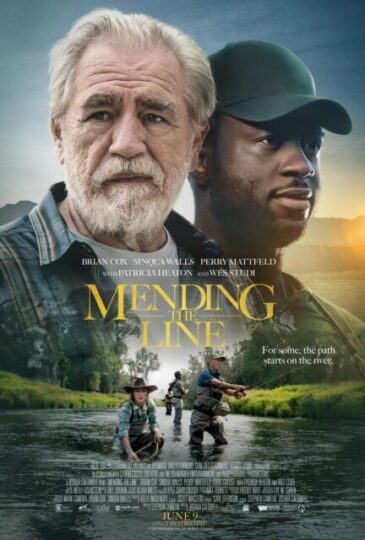March 26, 2024 update – this film is now available for streaming on Netflix and is #1 in movies today. If you think I should rewatch it and re-review it let me know in the comments!
(On this long weekend to mark Veterans Day, we give a shout out to all who have served. This blog donates 100% of its profits to charities, including Project Healing Waters Fly Fishing.)

A blurb in a copy of Fly Fisherman caught my eye. A narrative feature film about fly fishing, amazing! I was excited and intrigued. Mending the Line was released in theaters in June 2023 after debuting at film festivals in 2022. Filming took place in Montana in 2021.
The two best-known actors in it are the legendary Brian Cox (Super Troopers and Churchill among others) and the fantastic Native American actor Wes Studi (The Last of the Mohicans and The New World among others), whom the New York Times called one of the greatest actors of the 21st century.
I’ve read reviews of the film and would encourage you to do the same to hear a professional critics viewpoint. The film does have a good score of 6.5 on IMDB (in my opinion, anything over 6 on IMDB is good). Otherwise, I’ve got a better idea – let’s watch the trailer!
For background, read a Q&A with the director and the writer over at Fly Lords here. Now it’s choose your own adventure time: either go watch the movie (it’s available on multiple streaming platforms) or continue to read my brief thoughts which will spoil the fun for you. Yes, there’s really a movie out there that shows fly fishing that isn’t based on a Norman Maclean novella!
Spoilers ahead
Don’t say I didn’t warn you
Go watch the movie!
My conclusion is that Mending the Line is not a movie about fly fishing, as it’s more so a movie about trauma. The memorable themes for me were not fishing or therapeutic outdoor activities. The ones that stuck with me afterward were trauma, alcohol, and family strife. Your experience will vary.
I liked the fly fishing scenes and the time at the fly shop, all of which encompassed roughly 20 of the two hours and two minutes of running time. We need more fly fishing movies that can attempt to dethrone A River Runs Through It. It’s great that more stories are being written about military veterans from the wars in Iraq and Afghanistan and associated PTSD. War is hell, and we should all thank our fellow Americans and soldiers for their military service, whether or not they experienced combat.
But my biggest gripe with Mending the Line isn’t the acting or the writing or the cinematography, all of which I enjoyed. It’s the initial treatment of the traumatized veteran Colter, admirably played by Sinqua Walls, by his mentor. Rather than being accepted with open arms and immediately given an opportunity to grab a rod, he’s mistreated and castigated by the fly fishing instructor Ike Fletcher, played by a gruff Brian Cox.
I would like to hear what representatives from Project Healing Waters Fly Fishing think of the film, particularly about how intake works for veterans within their programs and how that conflicts with the experience of Colter. It’s abhorrent to think that a veteran in need, nevertheless one struggling with substance abuse, wouldn’t be given the accepting love they need and treated with an attitude of inclusion. Instead, Ike Fletcher resists helping him at first.
I know that care for our veterans could be improved, but it’s still difficult to watch a narrative of a veteran in need having a hard time getting help. I really wanted to like Mending the Line but had a hard time feeling good about it. Having Colter work for free in the fly shop as a borderline form of hazing seems unrealistic. While Ike Fletcher encourages Colter to stop drinking, he doesn’t do it in a sensitive or helpful way.
I appreciate more stories about PTSD and efforts to destigmatize it. But it was upsetting to watch a depressed veteran be offered therapy, in this case fly fishing, and then get mistreated when he tries to accept the offer. The other depressing elements – the opening scene of Middle Eastern carnage, the personal tragedy of Lucy (Perry Mattfeld), Ike as a non-existent father – didn’t help.
Perhaps, I take it for granted how therapeutic fly fishing is, and I don’t need a story to showcase it for me. For novices, this film will open eyes that there is a je ne sais quoi of fly fishing that you have to experience for yourself. In fact, there are many regional veterans service organizations across the country using fly fishing as a means of treatment. I know I love doing it, but I don’t frequently reflect on why.
I would still say go give Mending the Line a watch, but it’s a heavy film and there are only a few scenes with fly fishing that occupy short minutes. What do you think? I should reiterate that these opinions are my own, and that I’m still very much grateful that military veterans, PTSD, and fly fishing are all getting more attention on the big screen.
Written by Dave Hyde
Watertown, Mass.

Discover more from BlogFlyFish.com
Subscribe to get the latest posts sent to your email.

Just saw that this will be available on Amazon Prime Sept 26 according to Fly Fisherman
On Netflix now, top movie in their top ten!
Hi I consider myself an old 64-year-old man looking forward for retirement I’m at rookie when he comes to fly fishing I do a lot of deep sea fishing and Diving but when it comes to fly fishing I am a novice looking forward to learn more
Well James, this blog is a great resource and has plenty of information to help get you started. Welcome. PS – bring a 12 weight fly rod next time you go deep sea or offshore fishing!
Thank you for this review. I would point out that the mentor too had unresolved trauma. It took both of them to help each other heal. To me that’s why this film works. The teacher was just as much the patient as the pupil.
You’re welcome John! Well said, I agree with you and I appreciate the perspective.
Yes He was rough on Colter but he took suffered from some pain- my dad grew up with an alcoholic dad- drank too much himself- he was rough & lessons rough but truly helped me have courage & integrity – Thankful for hard things for they help with all life s challenges – liked the story the scenery – love that vets found this hobby also. Thanks for the film
( Are you the John Delk from Marietta Ga? Sang w me at Lum’s a few times)
Amazing film
Thanks for reading and glad you enjoyed the film Linda.
Excellent film about PTSD
Thanks for reading Ron, glad you enjoyed the film too.
Having worked for 15 years with combat Veterans diagnosed with PTSD, especially Marines as depicted in the film- its complex and each person has a different pathway to integrating trauma. Warm fuzzy doesn’t work for some. Particularly those with co occurring substance abuse. Its part because of the self loathing that accompanies trauma and the military mind set that creates a tough, “follow orders” mentality.
There’s a poetic reading about fly fishing during the film that was beautiful. So its not Academy Award caliber- still a good movie!
Thank you for your service to Veterans. Your comments are excellent. I really enjoyed the film and appreciate your insight.
It’s abhorrent to think that a veteran in need, nevertheless one struggling with substance abuse, wouldn’t be given the accepting love they need and treated with an attitude of inclusion. Instead, Ike Fletcher resists helping him at first. –blog quote
It’s a movie. Brian Cox was playing the role of “grumpy old man w serious baggage and a heart of gold.” You are meant to buy into the fictive world of the film, not object about whether this could or ought to “happen in real life.”
Fair enough Fernando. That element was just unenjoyable for me. Thanks for reading and the feedback, I understand where you’re coming from.
Great review, Dave! I just watched the movie and really enjoyed it.
The good news about PTSD is that research has revealed that EMDR is incredibly effective. I went through it, and I found it very helpful.
Also, there’s a book that has been on the best-seller list for a few years: “The Body Keeps the Score.” It is very good and explains how PTSD is not “just in the mind.” Trauma literally changes one’s neural pathways.
May all of our veterans receive the care they need. I am so glad that each year our blog gives away 100% of our profits to charities such as Project Healing Waters.
March 29 edit:
Here is a study of EMDR and combat veterans.